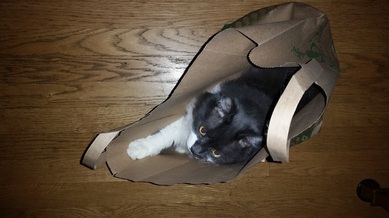 My cat, hiding from me. My cat, hiding from me. I got home at 6:30pm, after a long day of work. Angry. Hungry angry. Hangry. Even my cat was avoiding me. I went straight to the peanut butter jar, dug out the chocolate chips and went to town with my favorite sugar + fat snack. There was no way I could wait to make dinner. I needed a fix. It's hard to be graceful eating peanut butter out of the jar. I'm human, I fully admit it. My eating habits had a long way to go when I first started University, starry-eyed and bound for medical school. Over the first two years, I gained 15 lbs, started losing handfuls of hair, got easily overwhelmed and developed terrible sleeping habits. It was a rough go. By the time I started my Naturopathic medical training at the Canadian College of Naturopathic Medicine I had started making some very significant changes to diet. The biggest changes were cutting out processed crap (like the yellow powdered chicken broth that was previously a staple in my cooking), limiting wheat and increasing fat in my diet. Two years ago, however, I really hit the nail on the head. A colleague of mine, Dr. Erica Robinson, had been a big proponent of the Paleolithic Diet for quite sometime and it got me thinking. The Paleo Diet The Paleolithic Diet is based whole foods - lot of vegetables, a modest amount of fruit, lots of healthy fats and high quality protein - and is meant to simulate the way our ancient human ancestors during the Paleolithic era might have ate. At the same time, this style of eating limits ALL grains, beans and legumes, dairy, sugars, processed foods and alcohol. I know, it does sound drastic at first. Why would you do this to yourself??? We, as a species, have evolved over several hundred thousand years eating a certain way - foraging lots of greens, fruits, edible tubers, nuts and seeds, and when we could find it, meat including the higher fat organ meats. We moved a lot more, slept when the sun went down and had a heck of a lot more downtime to rest and play than we do today. It wasn't until the Neolithic era when agriculture really caught on that we started to settle down and dramatically increased the amount of grains and legumes in our diet. We stayed in one place, had a steady diet of grains, legumes and beans in addition to what those ancient ancestors ate. We had food security. Yes, that did happen thousands of years ago, however even that amount of time is only a small blip compared to the many years of eating in the hunter-gatherer style. The argument is that we are genetically evolved to be eating in this ancient, Paleolithic style, and our genetics are still playing a losing game of catch-up to our agriculture loving ancestor's grain and bean-based diet. Our DNA has no hope in hell to catch up with our modern diet full of genetically engineered wheat, corn, soy, processed fats, sodium, alcohol, antibiotic-laden dairy and other "food products". The Standard American Diet (SAD, for short) is forcing us to fight a bloody, uphill battle against our genetics... and it is one that we can't win. Numerous scientific studies have detailed that the SAD diet full of convenience but absolutely lacking nourishment are direct contributors to heart disease, diabetes, strokes, obesity and cancers amoung MANY other concerns. Yep, these are our biggest killers and we keep getting sicker, fatter, tired, depressed and miserable. So what did this peanut butter-loving Naturopath (to be) do? I read a LOT of books, including these: The Primal Blueprint: Reprogram Your Genes for Effortless Weight Loss, Vibrant Health, and Boundless Energy by Mark Sisson Paleoista: Gain Energy, Get Lean, and Feel Fabulous With the Diet You Were Born to Eat by Nell Stephenson The Paleo Solution: The Original Human Diet by Robb Wolf Practical Paleo by Diane Sanfilippo Make It Paleo: Over 200 Grain Free Recipes for Any Occasion - Bill Staley and Hayley Mason Well Fed: Paleo Recipes for People Who Love to Eat by Melissa Joulwan Dr. Loren Cordain's work and these blogs: Mark's Daily Apple NomNomPaleo Paleo OMG The Clothes Make the Girl I got rid of the grains, the sugar, beans, cut out dairy and threw out anything my great-great-great (x50) grandmother would not recognize as food. I increased the amount of produce I ate, set a limit of max 2 servings of fruit, dramatically increased the healthy fats, had high quality protein with each meal and got to work cooking. I seriously upped the quality of nutrition in my already "healthy" diet. I began to walk everywhere, made yoga a part of my day and allowed myself time to relax. I lost the 15 pounds of stress fat I put on through university and med school. I completely cured my insomnia. My acne cleared. My periods got more regular. I stopped losing handfuls of hair. I got used to saying "No thank you" to well-meaning friends and relatives offering me foods that made me feel ill. I felt truly empowered, knowing that I choose to take my health in my hands every day, that there are answers and that feeling ill did not have to be a given. And I was a heck of a lot more pleasant to be around. Are you interested? Book your free health consultation with me to start living the healthy life you know you deserve. “The food you eat can be either the safest and most powerful form of medicine or the slowest form of poison.” - Anne Wigmore Anne, you are right. I choose medicine. Awesome, tasty medicine. Check out how we do it! - Dr. Keila (no makeup Sunday) Xo
8 Comments
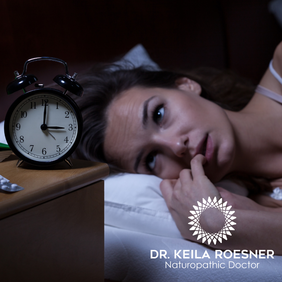
It was 2 pm and I was sitting in my first year physiology class at the Canadian College of Naturopathic Medicine.
I knew that it was important to stay awake but the more I tried to focus on my professor's words, I Just. Kept. Falling. Asleep. It felt so good, telling myself that I would just rest my eyes while listening to how the kidneys are supposed to work. Unfortunately I would wake with a gasp about every two minutes. I always blew my cover. I had told myself that I was just tired, that I didn't need to see anyone. I knew I didn't want the zombie pills that many of my family members were taking, you know, being a first year Naturopathic student and all. I needed help. That was the first time that I consulted a Naturopathic Doctor. Insomnia is one of the most common reasons for people to seek health care. Indeed, the vast majority of the patients I see have some sleep issues and are sometimes surprised to be told that they have insomnia. People with insomnia often have difficulty either falling or staying asleep, wake up too early and may feel un-refreshed in the morning. Insomniacs are also more likely to develop depression, anxiety, high blood pressure, heart disease, insulin resistance, diabetes, be overweight or obese, report substance abuse, have poorer cognitive performance and memory and take sick days from work. In other words, many of us are not sleeping and it is a problem. So what did I do? I learned the hard way. I know what it is like trying to function when you need to be at your best...and failing. I also learned that a few simple hacks can make all the difference. The Essentials for Good Sleep and Preventing Insomnia, Naturally:
If after implementing all of these measures consistently you are still having trouble sleeping, know that there are many options to help support you. As a Naturopathic Doctor, my role is to help identify the factors that may be contributing to your poor sleep, and helping you to create a treatment plan that is tailored to suit your lifestyle. I use a combination of therapies with great success to get my patients sleeping well. If you are interested in how I can help you, you are welcome to book a Health Discovery Session with me. I have helped many people, just like you, to get a good night's rest naturally. And me? I sleep like a baby now.
Are you overwhelmed trying to find a health care provider that "gets it"? Someone that is legit, not too woo-woo and who cares about you? You'll want to pay close attention if you are looking for a professional with a natural approach.
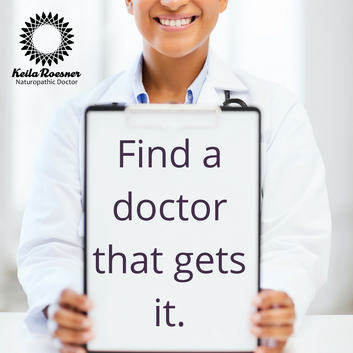 Find a doctor that gets it. Find a doctor that gets it.
1. They should be licensed.
Look for somebody with an accredited degree. For example, seeing a Doctor of Naturopathic Medicine, Doctor of Chiropractic, Doctor of Osteopathy, Registered Massage Therapist, Licensed Acupuncturist etc. means that they have completed an undergraduate degree, followed by specialized post-graduate degree and standardized licensing exams. Although there are lots of great weekend courses out there, there is no substitute for a rigorous medical education when it comes to your health. 2. A good referral network and social media following. You want to know that you are in good hands. If friends or family members are having good results with a certain practitioner, ask who they are seeing. Most people are only too happy to recommend their go-to person. Likewise, check for social media involvement - a website that is frequently updated, blog, Facebook, Twitter, YouTube videos etc. etc. show that the practitioner is engaged with current health issues and welcomes patients who are ready to "do the work". A good practitioner also knows when it is time to refer you elsewhere. 3. Experience in treating your concerns... Ask if the practitioner has ever worked with someone who has similar concerns. If there is a positive track-record working with people also experiencing acne, migraines, hypertension, or anxiety (for example) the Naturopathic Doctor probably has tried several different approaches, and has a few favorite strategies in mind. 4. ..and willing to look outside the box for answers. We are all different. What worked for your neighbour's Irritable Bowel Syndrome may not work for you. You want to know that your naturopath won't throw in the towel if the tried-and-trues are not getting you the results that you want. 5. Someone with whom you feel comfortable expressing your concerns, thoughts and opinions. This is by far the most important of all. Regardless of the piece of paper on the office wall, the number of years in practice or how busy the waiting room, you want to feel comfortable. Your naturopath, chiropractor, massage therapist, or acupuncturist should want to know how you are experiencing your symptoms. You should never feel pressured into treatments that you are uncomfortable with or come home with hundreds of dollars in supplements that you don't why you're taking. You should feel free to be honest, express your concerns and get feedback. I have practiced Naturopathic Medicine and acupuncture in Stratford, ON since 2013, and previously at the RSNC, Sherbourne Health Centre and Anishnawbe Toronto. I am licensed with the College of Naturopaths, OAND and CAND. I love working with a wide variety of health conditions in children, teens, men and women have great results with lots of people just like you. My bottom line is that I treat people, not just their disease. If you are looking to improve your health and want the highest quality of care book a Health Doscvery Session to see how I can help you. Dr. Keila Roesner Your Stratford Naturopath When our nerves are healthy, so are the muscles, tissues, joints and vessels that are supplied by that nerve. Acupuncture may help to improve nerve health. 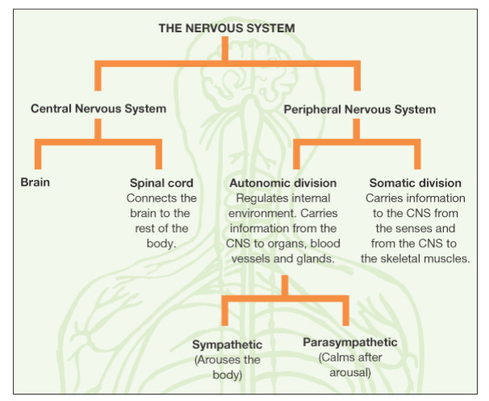 The Nervous System. Acupuncture can help to balance the Autonomic and therefore, Parasympathetic and Sympathetic Nervous System divisions via stimulation of certain nerves. The Nervous System. Acupuncture can help to balance the Autonomic and therefore, Parasympathetic and Sympathetic Nervous System divisions via stimulation of certain nerves. Acupuncture. I've been there. I use it every day in my practice for hormonal conditions, acute headache, stress and sleep disorders and most of all, pain management. Being the keener that I am, I spent my weekend in Toronto at the Canadian College of Naturopathic Medicine learning about integrative approaches to pain management using acupuncture. While acupuncture and Traditional Chinese Medicine (TCM) is a major component of the scope of practice of Naturopathic Doctors in Ontario, TCM is a field of study that could occupy a lifetime. I use on a daily basis with my patients and am constantly learning new ways to work with people. The take home of the course is that the Nervous System is King. When our nerves are healthy, so are the muscles and organs that they innervate. When the nerves are under- or over-stimulated, under-nourished, or damaged, the parts of the body that these nerves feed will be affected too. In other words, it is not about the sore back muscles or a herniated disc, but about the damaged spinal nerves causing those issues. Therefore, the most effective way of decreasing that pain is not just by sticking a needle where it hurts (along the lines of "medical acupuncture" that you might receive from your physiotherapist) but also by targeting the nerve that supplies that area. A Case of the Nerves Many disorders are related to the nervous system. For example, peripheral neuropathy is a condition that arises from apparently "normal" nerves wherein abnormal impulses are transmitted along the neuron resulting in pain, altered sensation, muscular weakness or changes in skin, hair and nail growth in that nerve's distribution. Peripheral neuropathy is associated with advanced Type 2 Diabetes, B12 deficiency anemia, kidney and thyroid disorders, alcohol abuse, autoimmune conditions and repetitive injuries. Conventional approaches include pain medication, antidepressant and anti-convulsive medications and lifestyle counseling for wound care, but sometimes fail to address why the nerve is unhealthy in the first place. In the picture below, you can see that there are several "departments" of the nervous system. The Autonomic Nervous System takes care of many body functions that we don't consciously control: breathing, sweating, blushing, the urge to urinate, salivation, respiration rate... although there are many instances where we probably want to. Diseases of Autonomic function include Fibromyalgia, heart failure, Diabetes Mellitus, sexual dysfunction, Parkinson's Disease, and Multiple Sclerosis and many others. The ANS is further divisible into the Parasympathic and Sympathetic Nervous System. The Parasympathetic Nervous System should be our dominant state of being, the "Rest and Digest" and even "Feed and Breed" mode. However, when we are constantly in a state of arousal: angry alarm clock, running late, report due, sitting in traffic, arguments etc. the Sympathetic Nervous System takes over. Better known for its "Fight or Flight" functions, the SNS serves to kick our bodies into high gear to help us survive a life-threatening attack. The problem is that our body has not evolved to differentiate between the stress of an impending shark attack or that presentation we have to give in front of the company. We only know that there is a threat. Problem? Yes. When we are constantly in overdrive, we take away vital resources from our body's essential day-to-day functions such as digesting without pain, tissue repair, restful sleep, consolidating short-term information into long-term memory and making babies. All of these concerns walk into my office on an regular basis. So what is a busy person to do? Train your body! In my practice, I teach people how to shift their bodies from a state of constant alarm in Flight or Flight into a more sustainable Rest and Digest mode. We can do this through deep breathing exercises, gentle movement, massage, cultivating a state of mindfulness and self-care. Sometimes, additional help such as botanicals (often in teas), homeopathy, supplementation and you guess it, acupuncture are helpful to reinforce that message. Consistency is key here. We adapt to patterns that may or may not be healthy for us, and it takes a repeated effort to initiate a new way of operating. Therefore, it is recommended that any changes you make, provided that they are safe and appropriate for you and under the guidance of a qualified health care professional, are used on a regular basis. Check me out.. I'm getting acupuncture to help rebalance my nervous system! If you are interested in acupuncture for pain management, book a Health Discovery Session with me to discuss if this treatment is right for you. |
Top 75 Naturopath Blogs & Websites For Naturopathic DoctorsAuthorDr. Keila Roesner is a Naturopathic Doctor. When not treating patients she is also an enthusiastic barefoot-strolling, music-loving, yoga-doing kitchen wiz - who also happens to be a wrestling fan. Categories
All
|
Let us take you from hormonal to whole.
|
Dr. Keila Roesner, BHSc ND
Naturopathic Doctor, Hormone Warrior and Your Wellness Cheerleader 247 Church Street, Stratford ON N5A 2R7 (519) 273-0900 drkeila@roesnerwellnesssolutions.com |
|

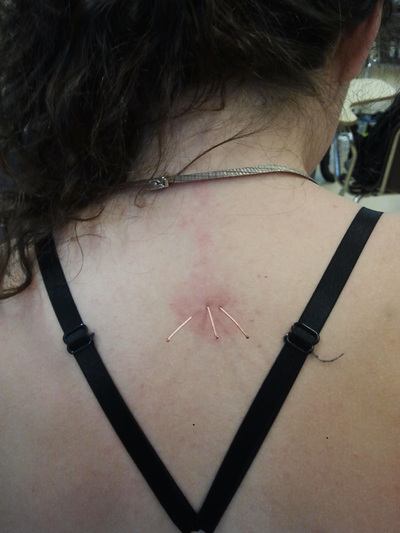
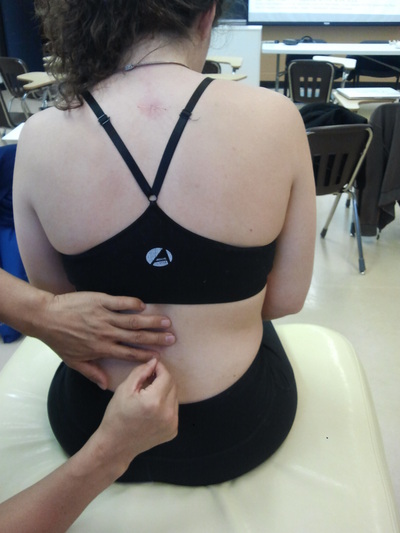

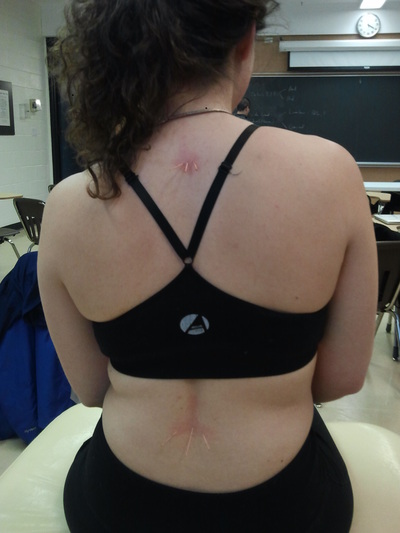
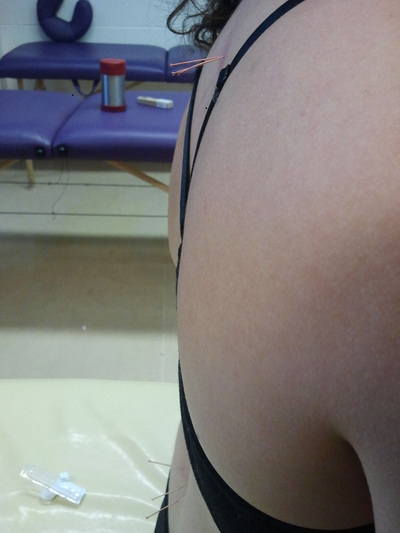

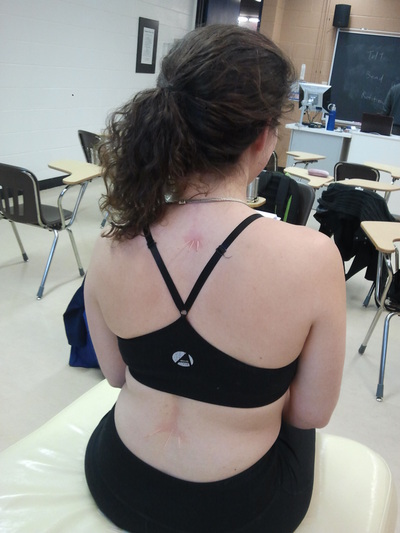
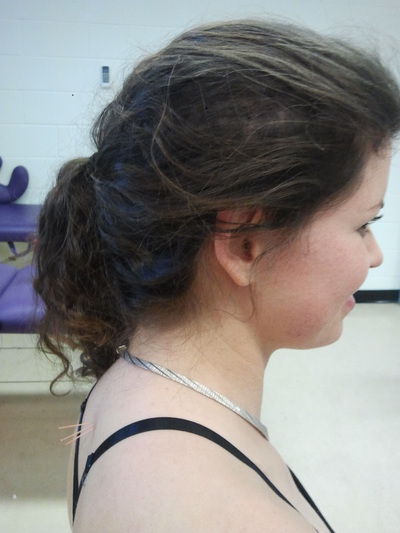

 RSS Feed
RSS Feed